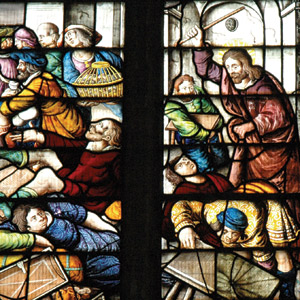 |
| Spirit Matters is a regular feature of In Trust. Melinda R. Heppe, pastor of two Lutheran churches in central Pennsylvania, is In Trust's contributing editor. (STAINED GLASS PHOTOS BY MIKE KNELL) |
My friend Louie sometimes appears at meetings wearing a T-shirt that reads, "Did you laugh? Then it's true." (He also has a hat that says, "I am their leader -- which way did they go?" but that is another story.)
I am a fairly right-brained sort of person, but even so, I struggled with the "did you laugh?" thing. Of course it's true -- and it isn't. We laugh sometimes when we are moved beyond comfort. We laugh when presented with a new perspective on an old truth. But we laugh at silliness, too -- where's the truth in that?
It got a little clearer recently when I heard a sermon which made most of the congregation laugh -- and probably not at a moment the preacher had intended. The line that caught us was, "It was not the location of the moneychangers that angered Jesus, but their arrogance."
Well, now.
Of course it was their location. The point of the story is that they were desecrating the temple, right?
Well, of course. And ...
... and that they had twisted good and helpful impulses into base greed. And that can happen anywhere. And suddenly the story wasn't about them, as we had always heard it. It was about us, and the laughter was that of recognition, uncomfortable though it was.

The preacher didn't need to spell it out.
It wasn't true, and it was, that the moneychangers' location was unimportant. The money changers and the merchants at the temple started out with the honorable motivation of providing a service. Bringing livestock into a city, especially a large and strange city, has always been a hassle. Why not leave it to professionals? And with pilgrims coming from everywhere, a little banking operation could only make things easier. Well and good. But somewhere along the way, some of those service providers got the notion that a worker is worthy of his hire (yes, I realize that Paul had not yet written that line).
Perhaps their reasoning went this way: The people using these services don't really appreciate the challenges involved. If we charge more, it demonstrates to everyone how important our work is. And from there, it's a short, steep slope to "what can we get away with charging?"
"Not as much as you are!" was Jesus' clear reply.

And suddenly, without any of that being spelled out, everyone in the congregation that day was looking at the services we provide with fresh eyes, less jaded eyes, maybe even innocent eyes.
And another piece fell into place. You may know that the word "silly" comes from the Anglo-Saxon selig, which means, among other things, "blessed." And behind that stands an older work, sel, which means innocent.
So, we laugh in unexpected moments of innocence, when we are given a glimpse through God's eyes.
And of course, all too often we immediately turn from those moments and label them silly in the less attractive sense of the word. We are embarrassed by our lapse into childlike wonder, and our laughter becomes cynical.
We tell ourselves we know better. But the gift remains. We all have a truth center, deeper than the pit of self-deception we all dig. And it may not have at hand all the verbal resources of our left brain. But it recognizes what we might otherwise attempt to ignore and signals us with the most basic and joyful response.


Did you laugh?
Then it is very probably true -- and you should pay respectful attention.
May you laugh often and joyfully throughout your tenure.